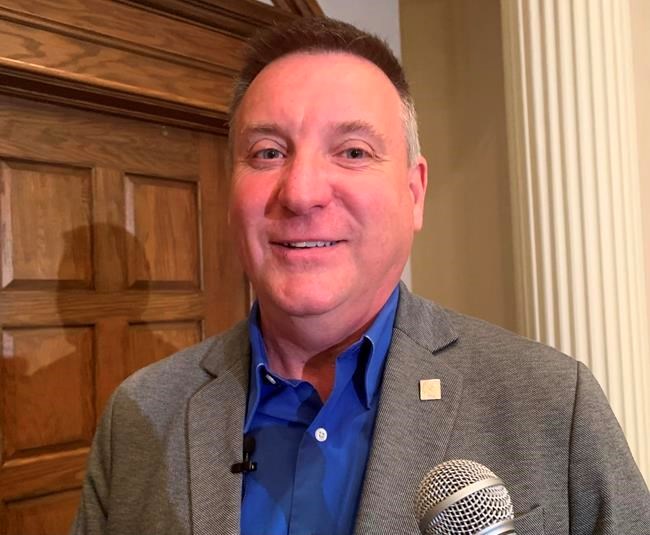ST. JOHN'S, N.L. — Newfoundland and Labrador's Progressive Conservative leader says the province is being outdone by Nova Scotia when it comes to recruiting doctors, especially after news that Ukrainian physicians who sought refuge in Newfoundland feel ignored.
Opposition leader David Brazil said Tuesday he's aware of efforts by Nova Scotia's Health Department to persuade Ukrainian doctors in Newfoundland to resettle in Nova Scotia. He said Nova Scotia has also successfully attracted other doctors from Newfoundland and Labrador, and from outside of Canada.
"They are very aggressively reaching out to physicians everywhere, regardless if they're already licensed as Canadian physicians, or if they're refugees or new citizens of this country," Brazil told reporters in St. John's. "They're being a little bit more flexible, they're being more creative, they're being more assertive .... It's what we should be doing."
Brazil's news conference Tuesday came after a Ukrainian physician who fled Russian attacks in her country and relocated to St. John's told The Canadian Press she was frustrated by a lack of communication from the provincial government. Her sentiments were echoed by Michael Holden, a St. John's resident who has been helping 10 Ukrainian doctors resettle in Newfoundland. He said the doctors want to become licensed to practise in the province but have had no offers of help from the government.
Meanwhile, Holden said, officials from Nova Scotia were offering housing and daycare if they relocated to that province. Nova Scotia also built an online intake survey for health-care professionals from Ukraine aimed at matching them with appropriate jobs.
A spokeswoman from Nova Scotia's Department of Health and Wellness said Tuesday that the province isn't aware of any "proactive communications" involving two recruitment offices with Ukrainian health-care workers in other provinces.
"However, anyone who completes Nova Scotia Health's intake form is being followed up with regardless of where they reside," Khalehla Perrault said in an email.
In response to a social media post Holden made about an exasperated Ukrainian doctor in Newfoundland, Health Minister Tom Osborne on Sunday invited Ukrainian physicians to contact his office.
Meanwhile, Newfoundland and Labrador's medical association released a poll last month showing nearly one in four residents are without a family doctor. Doctor shortages are particularly acute in rural areas, where hospitals and health centres are regularly shutting down emergency services because there aren't any physicians to run them.
Brazil acknowledged Tuesday that physicians from outside of Canada typically must take exams and language proficiency tests to become licensed in the country. But he said the province could offer supports and incentives and perhaps investigate a way to speed up the process. Efforts could also be made to screen health-care professionals for skills and training that could qualify them for jobs in the meantime, he added.
"If you're going to recruit a physician here, you've got to look at what are the other services they're going to need. It's their family needs in particular that may be important here," he said. "Is there other additional training, or some other supports around housing, that may need to be done?"
Brazil applauded Newfoundland and Labrador Immigration Minister Gerry Byrne for setting up a satellite office in Poland to help Ukrainians fleeing the war resettle in the province. But that care and communication should continue when the Ukrainians arrive in St. John's, he said, especially if they're professionals from high-demand fields.
Osborne and Premier Andrew Furey launched a recruitment and retention campaign for health-care professionals last week in Bonavista, a town of about 3,500 people that has been plagued by emergency room shutdowns. In May, he appointed an assistant deputy minister of health professional recruitment and retention.
The provincial Department of Health and Community Services did not immediately respond to a request for comment.
This report by The Canadian Press was first published July 19, 2022.
Sarah Smellie, The Canadian Press




